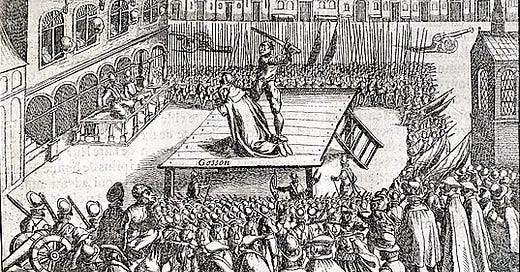A very British execution
“Britain is broken,” they said. “Our political system is in tatters. Your house is on fire. And somewhere a small Tunnock’s teacake has achieved sentience and is screaming in horror at a Union Jack. The country is in turmoil. And, like in times gone by, there is only one thing we can turn to in order to heal our wounds: human sacrifice.”
Your stomach tightened. It seemed like a bold suggestion. Nonetheless, it was true that you had been beset by a feeling of gnawing anxiety lately. The sense that nothing was quite as it had been, whenever that was. In olden times. Somewhere before Bullseye, but after Churchill. When the streets flowed with lukewarm tea and bathrooms had carpets. A human sacrifice promised something that was at least as good as an improvement if not, because it required very little in the way of thinking, better: a change!
You leaned forward in your chair. You were interested. The voice, that came from everywhere and nowhere at once; from your TV, from that website, from your best friend after a couple of drinks when the barmaid had gone to change the barrel and you could be sure no-one was listening, continued: the execution needn’t even be that troubling. There were people who would volunteer. Or should do, if they knew what was good for them. You felt smug. You knew people like that. You spent a few moments imagining them getting what was coming to them, good and proper. You didn’t tell anyone, but you were sold.
When the day arrived, you had second thoughts. Perhaps the occasion itself would be tasteless, gaudy, an unseemly entertainment for someone like you who opened doors for old ladies and donated monthly to the RNLI? But it had to be said, those fears were quickly put to bed. To ensure there were no awkward silences, Dermot O’ Leary was compering. He was the perfect choice, you thought to yourself, capable of both ice-breaking banter and, when the situation required it, a handbrake turn into moist-eyed seriousness. He was the kind of person you wanted in the room when you had a baby or tearfully confessed to a murder. Dermot O’ Leary would hold your hand, without judgment, and ask how your nan would feel if she could see you now. This is exactly what the nation needed. If you were honest with yourself, you needed it too.
The event took place at a ticketed festival in Hyde Park. It had been hotly anticipated and places, dispensed via a website run by a major events company, had disappeared in minutes. The kids were excited you managed to get some and had bragged about it to classmates. You, being an adult and therefore more circumspect about your gloating, had barely mentioned it except when you asked for a day off work. Once inside, you were disappointed to find that the arena was smaller than expected and it was difficult to get close to the stage, due to a VIP area sponsored by Vodafone which allowed customers on monthly direct debits to watch the action up close. Nevertheless, you staked out a space close to the toilets and across from a hot dog stand. You hoisted your youngest on your shoulders, unscrewed your reusable water bottle, and waited for death to begin.
The next few minutes were a blur. Dermot O’ Leary did his introductory patter, deftly blending a playful nod to the unusual nature of the occasional with an earnest acknowledgment of the British public’s rightful lust for vengeance. After all, what a year it had been! The rogue’s gallery were brought onto the stage and you and your children enjoyed booing for the villains and whooping for your favourites. There were a few familiar faces: a politician who combined babyish cunning with an air of learned helplessness, a withered social media heel who only the dullest still bothered disliking, a celebrity experiencing an untreated mental health episode, a leopard from a David Attenborough documentary. Then, more uneasily, there were the regular folk, the individuals who’s petitions had only snowballed thanks to a blip in the algorithm or an unexpected stroke of bad luck. One of them, eyes agog with panic, poked onto the stage with spears by a group of stagehands, had nominated herself as a joke on Facebook and become a national phenomenon via an unexpected endorsement from Joanna Lumley and Ice Cube. She hadn’t realised that once written the death warrant was permanent, only to be reversed by the whims of the crowd.
Once the sacrificial lamb had been selected and the jeering abated, the executioner stepped forward. They dropped their hood to reveal a popular late-night panel show comedian. It was a clever choice. If criticised in future, she could always claim it was a joke. As the blade lifted, you experienced a moment of doubt - what if the memory of this at some point were to make you uneasy? - but it dispersed quickly. The blade dropped, the head tumbled into a bucket and along a complex system of transparent tubes and wheels like the lottery ball to ensure it could be admired by the entire audience. It would later be displayed on a pike as part of an interactive exhibit sponsored by the same National Lottery and it’s there, clutching your youngest’s chocolate-covered fingers, that the vague feeling of familiarity coalesces and you remember that you knew the guy from school, that you actually quite liked him. His eyes stare blankly over your shoulder and into the crowd with an uncomfortable intensity. You feel annoyed. You wish you hadn’t paid so much for a ticket. Thirty-five quid for a family of four was practically criminal. You decide, on the way out, to complain.
Thanks for reading. This is an excerpt from my free weekly newsletter which you can subscribe to here…



